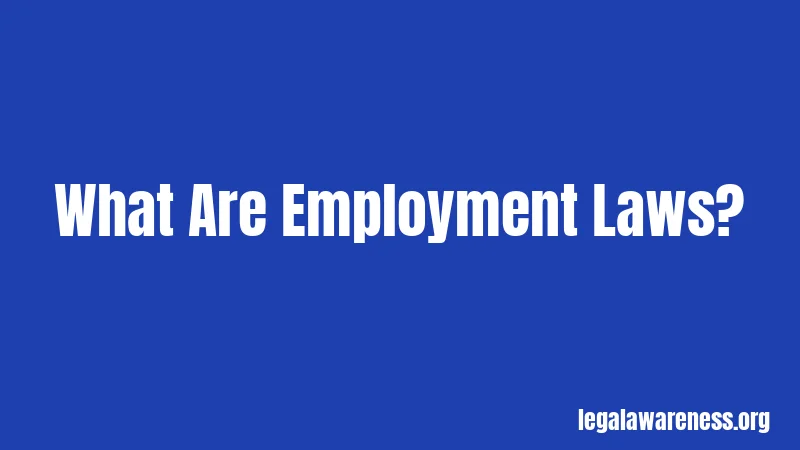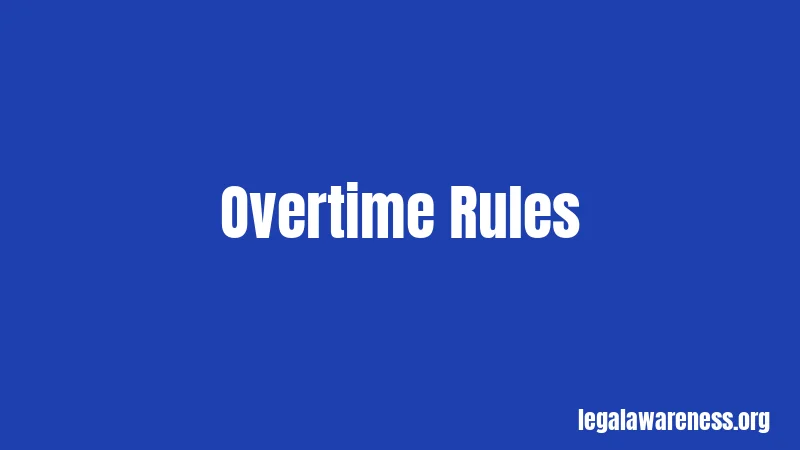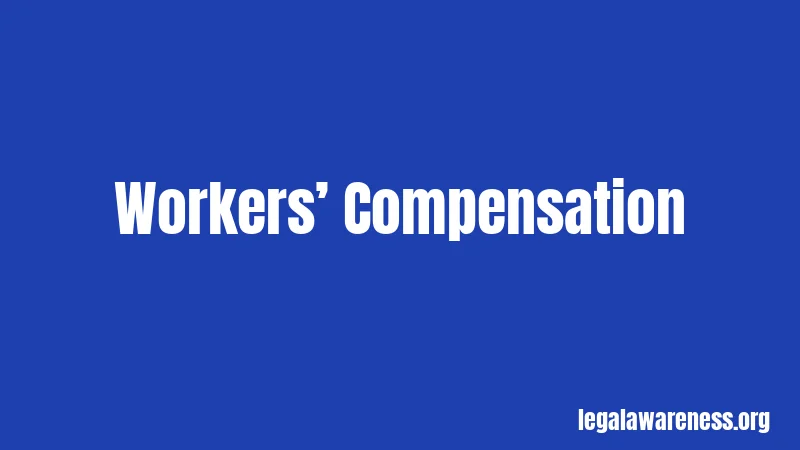Employment Laws in Michigan (2026): What Just Changed
Big news for Michigan workers and employers. The state just rolled out some major employment law changes. Seriously. These aren’t small tweaks. We’re talking about pay increases, new sick leave rules, and updated protections that affect almost everyone.
Most people have no clue how much changed in early 2025. But if you work in Michigan or run a business here, you need to know this stuff. Let’s break down exactly what these laws mean for you.
What Are Employment Laws?

Employment laws are rules that protect workers and guide employers. They cover things like how much you get paid, when you can take breaks, and what happens if you get hurt at work.
These laws exist for a good reason. They make sure everyone gets treated fairly. Without them, workers could face unfair pay, unsafe conditions, or discrimination.
Michigan has both state and federal employment laws. When they’re different, the law that protects workers better is the one that applies. Makes sense, right?
Minimum Wage Laws
Current Minimum Wage Rates
Here’s where things get interesting. Michigan’s minimum wage jumped significantly in 2025 and it’s going up again soon.
As of February 21, 2025, the minimum wage is $12.48 per hour. But hold on. That changes on January 1, 2026, when it increases to $13.73 per hour. Then it goes up again on January 1, 2027 to $15.00 per hour.
Not everyone gets the full minimum wage though. Minors aged 16 and 17 earn 85% of the minimum wage. That’s $11.67 per hour starting January 1, 2026.
There’s also a training wage. Employers can pay workers under 20 years old just $4.25 per hour for their first 90 days. After that, regular minimum wage kicks in.
Tipped Workers
Tipped employees have their own rules. The tipped minimum wage is $5.49 per hour starting January 1, 2026. That’s 40% of the full minimum wage.
But here’s the deal. Your tips plus your hourly wage must equal at least the regular minimum wage. If they don’t, your employer has to pay the difference. They can’t just leave you short.
Employers must tell you about their tip policies. You need to report your tips. And if your tips don’t bring you up to minimum wage, the employer pays what’s missing. Simple as that.
The tipped minimum wage is being phased out completely by 2030. Each year it goes up by a percentage until tipped workers earn the same as everyone else.
Overtime Rules

Who Gets Overtime Pay
Wondering if you qualify for overtime? Most workers do. If you work more than 40 hours in a week, you earn overtime pay at 1.5 times your regular rate.
Some employees are exempt though. Workers earning more than $684 per week who do executive or managerial work don’t get overtime. Neither do certified professionals like lawyers or engineers.
But here’s what changed. More workers now qualify for overtime protection. Previously, only certain categories were eligible. Now Michigan has expanded these protections to cover more people, especially those in lower-income or hourly positions.
How Overtime Works
Let’s say you normally make $15 per hour. You work 45 hours in a week. You get paid regular rate for the first 40 hours. For those extra 5 hours, you earn $22.50 per hour (that’s 1.5 times $15).
Pretty straightforward. Your employer must track your hours accurately. They need to keep records of when you work and what you earn. This protects both of you.
If you’re not getting paid for overtime you earned, that’s a violation. You can file a complaint with the Department of Labor and Economic Opportunity.
Earned Sick Time Act (ESTA)
Okay, this one’s important. The Earned Sick Time Act went into effect on February 21, 2025. It replaced the old Paid Medical Leave Act.
How Sick Time Works
You earn 1 hour of paid sick time for every 30 hours you work. That adds up fast. Employers with more than 10 employees must allow up to 72 hours of paid sick time per year. Smaller employers can cap it at 40 hours.
Small businesses got a break though. If your employer has 10 or fewer employees, they didn’t have to start providing sick time until October 1, 2025.
You can use sick time for personal illness. Or to care for a family member. Or for issues related to domestic violence or sexual assault. These are all valid reasons.
Your sick time carries over to the next year. But employers can cap how much you carry over. Big employers cap it at 72 hours. Small ones at 40 hours.
What Changed
The old law only covered employers with 50 or more employees. Now everyone’s covered. Even small businesses have to provide sick time.
Trainees, interns, and youth employees don’t get sick time. Neither do employees who schedule their own hours and aren’t subject to disciplinary action.
Employers can “frontload” sick time. That means giving you the full amount at the start of the year instead of making you accrue it. If they do this, you can use it right away.
Notice requirements changed too. If you need sick time unexpectedly, you give notice as soon as you can. Or you follow your employer’s policy if they have one and gave you a copy.
Workers’ Compensation

Who Needs Coverage
Most Michigan employers must carry workers’ compensation insurance. You need it if you have three or more employees at any time. Or if you have one employee working 35 hours or more per week for 13 weeks.
Both public and private employers need coverage. Some exceptions exist though. Agricultural employers with fewer than three employees working less than 35 hours weekly are exempt. So are independent contractors, sole proprietors, and family members working for relatives.
If your employer doesn’t have required coverage, they face fines and work bans. They could also face civil lawsuits. This is serious stuff.
What It Covers
Workers’ comp provides several benefits. Medical treatment for work-related injuries or illnesses. Lost wages after seven days off work. Rehabilitation services. Disability benefits. Death benefits for families.
Here’s how the waiting period works. If your injury keeps you out of work for more than seven days, you get benefits starting on the eighth day. If you’re out for 14 consecutive days or longer, you get paid for those first seven days too.
You have 90 days to notify your employer about a work injury. Then you have two years to file a claim for compensation. Don’t wait too long.
How Much You Get
Workers’ comp pays 80% of the difference between your pre-injury wages and your post-injury earning capacity. But there’s a maximum weekly rate. For claims filed in 2026, the max is $530 per week.
Not everyone gets the maximum though. Your benefit amount depends on your wage history. The higher your wages before the injury, the more you get.
Specific loss benefits exist for certain injuries. If you lose a thumb at work, you get 65 weeks of compensation benefits. This applies regardless of whether you’re disabled.
Workplace Discrimination Laws
Protected Categories
Michigan law protects workers from discrimination. You can’t be treated unfairly because of religion, race, color, national origin, age, sex, sexual orientation, gender identity or expression, height, weight, or marital status.
Yep, that’s right. Gender identity and sexual orientation protections were recently added. This is a big deal. Employers can’t discriminate based on these characteristics anymore.
Disability discrimination is illegal too. Employers must provide reasonable accommodations for workers with disabilities. Unless it causes undue hardship.
The Elliott-Larsen Civil Rights Act covers this. So does the Persons with Disabilities Civil Rights Act. Both state laws offer strong protections.
What Counts as Discrimination
Discrimination can happen at any stage. During hiring. In pay decisions. When considering promotions. In training opportunities. Or when firing someone.
It also includes harassment. Creating a hostile work environment based on protected characteristics is illegal. So is denying reasonable workplace changes you need for religious beliefs or disability.
Retaliation is illegal too. Your employer can’t punish you for filing a discrimination complaint. Or for participating in an investigation. Or for refusing to follow discriminatory orders.
Sexual harassment falls under sex discrimination. This includes unwanted sexual advances, requests for sexual favors, and other verbal or physical harassment of a sexual nature.
Filing Discrimination Complaints
Where to File
You have two main options. The Michigan Department of Civil Rights (MDCR) or the Equal Employment Opportunity Commission (EEOC).
With MDCR, you file within 180 days of the discriminatory act. The EEOC gives you 300 days if state law also applies. Both agencies investigate complaints.
They have a work-sharing agreement. Filing with one often means filing with both. You don’t need to file separately with each agency.
The process takes time though. Sometimes nearly a year. An investigator reviews your case. They might request documents. Interview witnesses. Sometimes visit your workplace.
What Happens Next
The agency might offer mediation. This is voluntary. Both sides try to settle the claim without going to court.
If they find discrimination, they can’t force your employer to do anything. But they can issue a “right-to-sue” letter. This allows you to file a lawsuit.
If they don’t find enough evidence, you still get a right-to-sue letter. You have 90 days from receiving it to file in court if you want.
Document everything. Keep records of discriminatory incidents. Names, dates, times, communications. All of it. This helps your case.
Break and Meal Period Laws
Adults Don’t Get Mandatory Breaks
Here’s something that surprises people. Michigan doesn’t require employers to give adult workers meal or rest breaks. Seriously.
If you’re 18 or older, your employer doesn’t legally have to give you a lunch break. Or any breaks at all. This applies to both state and federal law.
But here’s the thing. If an employer chooses to offer breaks, they must follow certain rules. Short breaks of 20 minutes or less must be paid. They count as work time.
Meal breaks of 30 minutes or longer can be unpaid. But only if you’re completely relieved of duties. If you have to answer phones or help customers, it’s paid time.
Minors Get Protection
Workers under 18 have different rules. If you work more than five continuous hours, you must get a 30-minute break. No exceptions.
This break must be uninterrupted. You can’t be asked to work during it. No answering phones. No monitoring equipment. Nothing.
Employers who don’t give minors this break face penalties. The law protects younger workers and makes sure they get rest during long shifts.
For example, a 16-year-old working a 6-hour shift gets a 30-minute break. A 4-hour shift doesn’t require one under this law.
Unemployment Benefits
Who Qualifies
To get unemployment benefits, you must be unemployed through no fault of your own. You need to be registered for work at MiTalent.org. Visit a Michigan Works service center to start the reemployment process.
You must be available for work. Willing to accept suitable full-time employment. Able to work physically and mentally. And actively seeking suitable full-time work.
You also need to meet wage requirements over four of the last five calendar quarters. Not everyone qualifies.
The maximum benefit period is 26 weeks. This increased from 20 weeks in 2025. Claims filed in 2026 qualify for up to $530 per week. That’s up from $446 in 2025.
How Much You Get
Not everyone receives the maximum. Your benefit amount depends on your wage history. Higher wages before unemployment mean higher benefits.
You also get money for dependents. Up to five dependents count. The amount per dependent increases on January 1, 2026 to $19.33.
Claims filed before January 1, 2026 don’t see a change in their approved weekly benefit rate. The increase only applies to new claims filed in 2026.
If you refuse a bona fide offer of reasonable employment, you could lose benefits. Same if you’re fired for misconduct.
Retaliation Protection
What Is Retaliation
Retaliation happens when an employer punishes you for a protected activity. Protected activities include filing complaints about discrimination or harassment. Participating in investigations. Reporting violations to government agencies.
Employers can’t fire you for these things. They can’t demote you. Cut your pay. Change your schedule. Or take any other negative action against you.
The Whistleblowers’ Protection Act protects workers who report violations. Including reports to OSHA and industry governing bodies.
Other laws protect specific situations. The Elliott-Larsen Civil Rights Act protects workers who file discrimination complaints. The Persons with Disabilities Civil Rights Act does the same for disability discrimination.
Your Rights
If you experience retaliation, you can file a lawsuit. You might get your job back. Recover lost wages. Get attorney’s fees paid. Win other damages.
Document everything related to the retaliation. When it happened. Who was involved. What changed at work. Keep emails, texts, performance reviews.
Talk to an employment lawyer. They can explain your options. Help you understand if what happened qualifies as illegal retaliation.
Time limits apply though. Don’t wait too long to take action. The sooner you file, the better your chances.
At-Will Employment
What It Means
Michigan is an at-will employment state. This means employers can fire you for almost any reason. Or no reason at all. And you can quit anytime without giving a reason.
Sounds scary, right? But there are exceptions. Employers can’t fire you for discriminatory reasons. Or in retaliation for protected activities. Or if you have an employment contract that says otherwise.
If you have a written contract guaranteeing employment for a specific time, at-will doesn’t apply. Your employer can’t fire you before that period ends without cause.
Union contracts often override at-will status too. Collective bargaining agreements spell out specific terms for termination.
Protection from Wrongful Termination
Even with at-will employment, wrongful termination protections exist. You can’t be fired for refusing to break the law. Or for reporting illegal activity. Or for filing a workers’ comp claim.
Public policy exceptions protect you too. If your firing violates a clear public policy, that’s wrongful termination.
If you believe you were wrongfully terminated, file a complaint with MDCR. Or consult an employment lawyer. You might have legal options.
Keep records of everything related to your termination. The reason given. Communications with your employer. Your work performance. All of it helps your case.
What Employers Must Do
Record Keeping
Employers must keep accurate records. Hours worked. Wages paid. Overtime. Deductions. All of it.
This protects both employer and employee. If there’s a dispute about pay, good records settle it quickly.
Pay stubs must show certain information. Dates of the pay period. Any deductions. Hand harvester employees need total units harvested on their pay stubs too.
Records must be kept for specific time periods. Usually at least three years. Some records require longer retention.
Posting Requirements
Employers must display certain posters in the workplace. The minimum wage poster is required. Updated posters showing the new rates must be up by specific deadlines.
The ESTA poster must be displayed too. Employers had until March 23, 2025 to provide this. It explains employees’ rights under the sick time law.
Other required posters cover discrimination laws, workers’ compensation, and unemployment insurance. Check with the Michigan Department of Labor and Economic Opportunity for current posting requirements.
Fines apply for not posting required notices. Employers can face civil penalties. It’s easier to just post them correctly.
Frequently Asked Questions
What is Michigan’s minimum wage in 2026? The minimum wage is $13.73 per hour starting January 1, 2026. It increases to $15.00 per hour on January 1, 2027.
Do I get paid breaks in Michigan? Only if you’re under 18 and work more than five hours. Adult workers don’t have a legal right to breaks, but if your employer offers short breaks of 20 minutes or less, those must be paid.
How much sick time can I earn? You earn 1 hour for every 30 hours worked. Employers with over 10 employees must allow up to 72 hours per year. Smaller employers can cap it at 40 hours.
What should I do if I’m discriminated against at work? Document everything and report it to HR. If that doesn’t work, file a complaint with the Michigan Department of Civil Rights or the EEOC within 180 days of the discriminatory act.
Can my employer fire me for filing a workers’ comp claim? No. That’s illegal retaliation. You’re protected from being fired for filing workers’ compensation claims or exercising other legal rights.
Final Thoughts
Michigan’s employment laws changed a lot recently. Minimum wage went up. Sick time expanded. Protections got stronger. These changes affect almost every worker and employer in the state.
Know your rights. Whether you’re an employee or an employer, understanding these laws matters. They protect workers from unfair treatment and help employers stay compliant.
If you’re unsure about something, ask. Talk to HR. Consult the Department of Labor and Economic Opportunity. Get legal advice if needed. It’s better to ask than to guess wrong.
References
- Michigan Department of Labor and Economic Opportunity – Minimum Wage & Overtime
- Michigan Legislature – Elliott-Larsen Civil Rights Act
- Foster Swift – Michigan Employment Law Changes Coming in 2025
- Michigan Department of Civil Rights – For Victims of Unlawful Discrimination
- Michigan Legislature – Workers’ Disability Compensation Act
